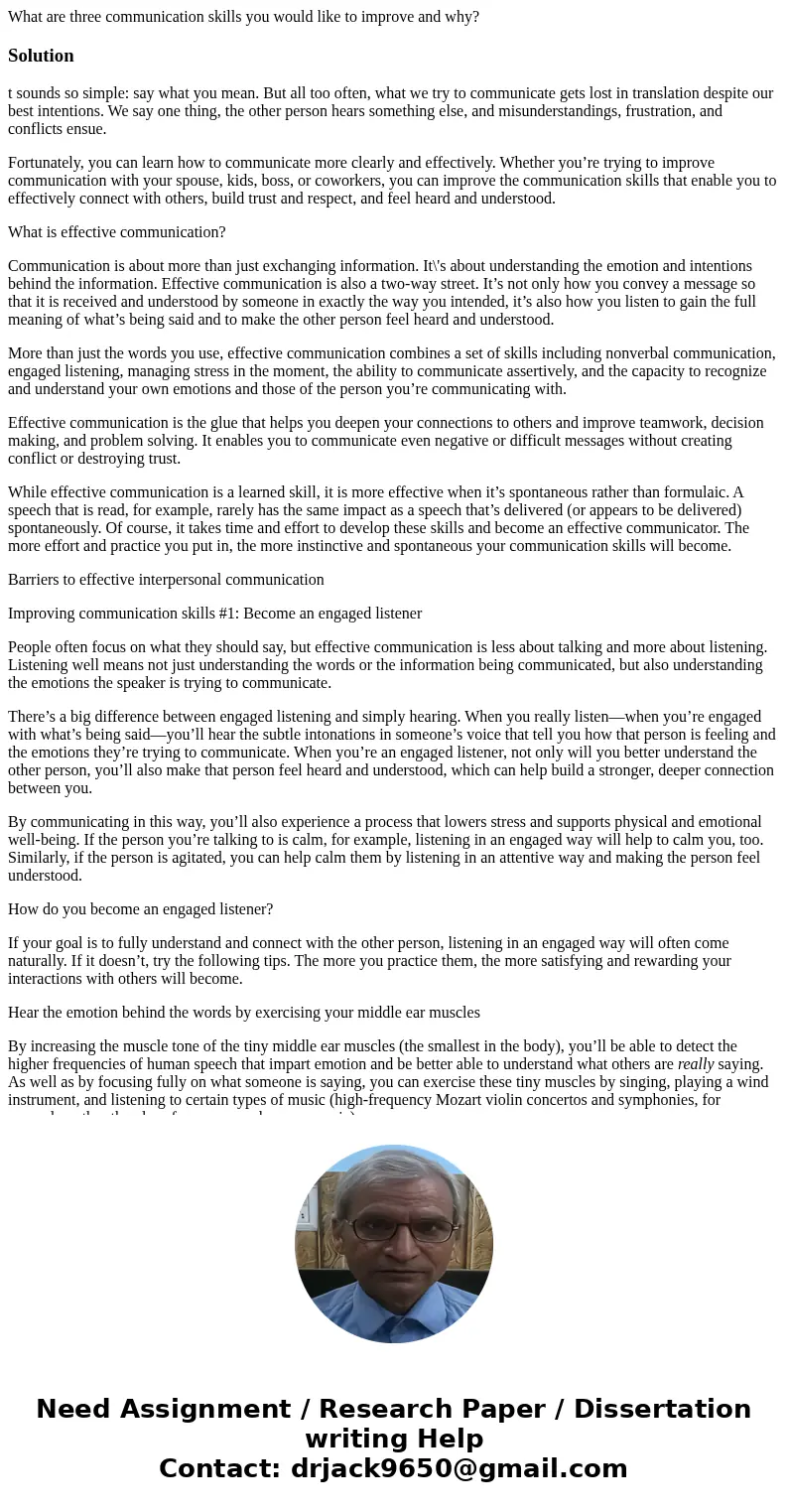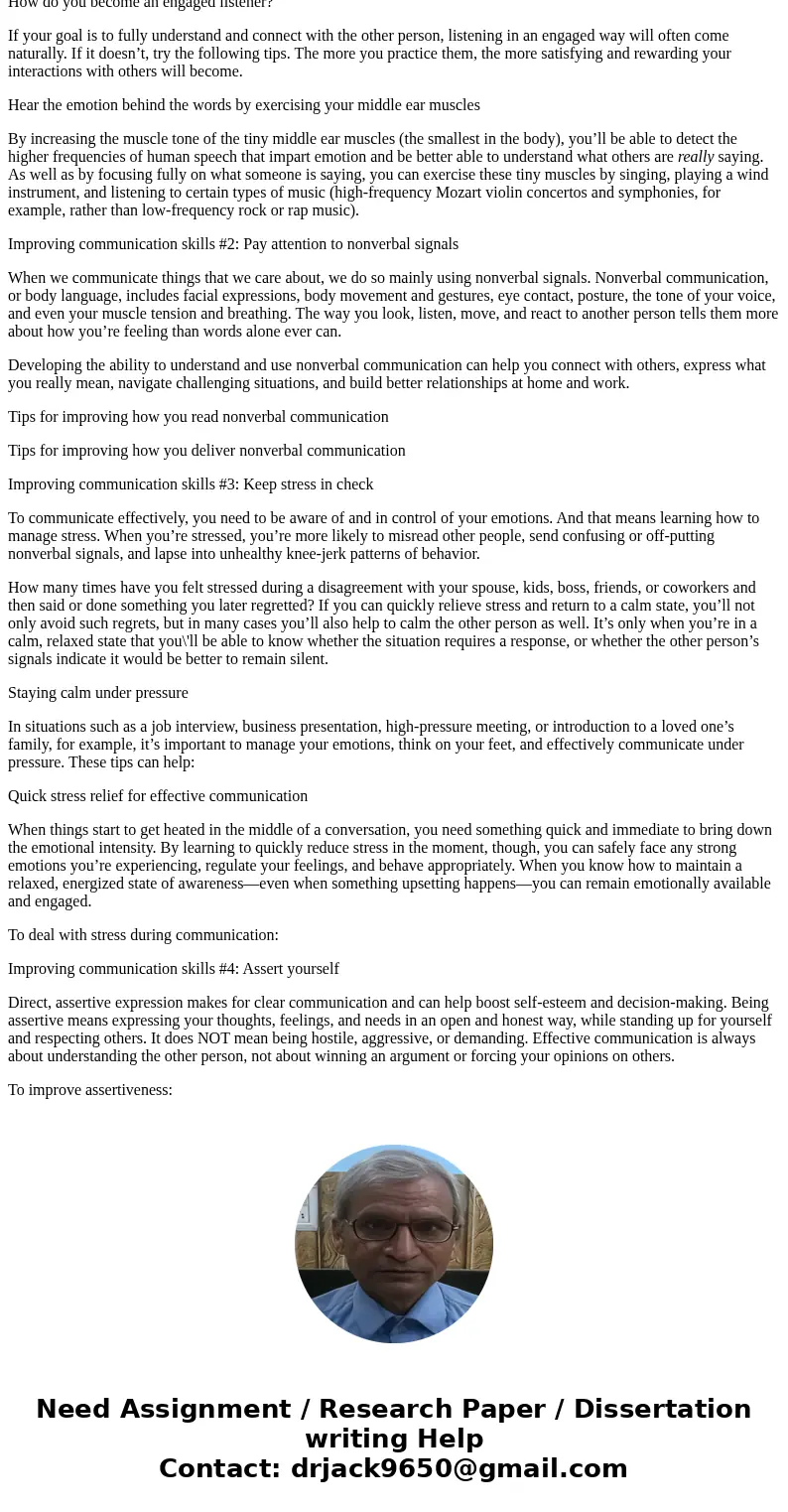What are three communication skills you would like to improv
What are three communication skills you would like to improve and why?
Solution
t sounds so simple: say what you mean. But all too often, what we try to communicate gets lost in translation despite our best intentions. We say one thing, the other person hears something else, and misunderstandings, frustration, and conflicts ensue.
Fortunately, you can learn how to communicate more clearly and effectively. Whether you’re trying to improve communication with your spouse, kids, boss, or coworkers, you can improve the communication skills that enable you to effectively connect with others, build trust and respect, and feel heard and understood.
What is effective communication?
Communication is about more than just exchanging information. It\'s about understanding the emotion and intentions behind the information. Effective communication is also a two-way street. It’s not only how you convey a message so that it is received and understood by someone in exactly the way you intended, it’s also how you listen to gain the full meaning of what’s being said and to make the other person feel heard and understood.
More than just the words you use, effective communication combines a set of skills including nonverbal communication, engaged listening, managing stress in the moment, the ability to communicate assertively, and the capacity to recognize and understand your own emotions and those of the person you’re communicating with.
Effective communication is the glue that helps you deepen your connections to others and improve teamwork, decision making, and problem solving. It enables you to communicate even negative or difficult messages without creating conflict or destroying trust.
While effective communication is a learned skill, it is more effective when it’s spontaneous rather than formulaic. A speech that is read, for example, rarely has the same impact as a speech that’s delivered (or appears to be delivered) spontaneously. Of course, it takes time and effort to develop these skills and become an effective communicator. The more effort and practice you put in, the more instinctive and spontaneous your communication skills will become.
Barriers to effective interpersonal communication
Improving communication skills #1: Become an engaged listener
People often focus on what they should say, but effective communication is less about talking and more about listening. Listening well means not just understanding the words or the information being communicated, but also understanding the emotions the speaker is trying to communicate.
There’s a big difference between engaged listening and simply hearing. When you really listen—when you’re engaged with what’s being said—you’ll hear the subtle intonations in someone’s voice that tell you how that person is feeling and the emotions they’re trying to communicate. When you’re an engaged listener, not only will you better understand the other person, you’ll also make that person feel heard and understood, which can help build a stronger, deeper connection between you.
By communicating in this way, you’ll also experience a process that lowers stress and supports physical and emotional well-being. If the person you’re talking to is calm, for example, listening in an engaged way will help to calm you, too. Similarly, if the person is agitated, you can help calm them by listening in an attentive way and making the person feel understood.
How do you become an engaged listener?
If your goal is to fully understand and connect with the other person, listening in an engaged way will often come naturally. If it doesn’t, try the following tips. The more you practice them, the more satisfying and rewarding your interactions with others will become.
Hear the emotion behind the words by exercising your middle ear muscles
By increasing the muscle tone of the tiny middle ear muscles (the smallest in the body), you’ll be able to detect the higher frequencies of human speech that impart emotion and be better able to understand what others are really saying. As well as by focusing fully on what someone is saying, you can exercise these tiny muscles by singing, playing a wind instrument, and listening to certain types of music (high-frequency Mozart violin concertos and symphonies, for example, rather than low-frequency rock or rap music).
Improving communication skills #2: Pay attention to nonverbal signals
When we communicate things that we care about, we do so mainly using nonverbal signals. Nonverbal communication, or body language, includes facial expressions, body movement and gestures, eye contact, posture, the tone of your voice, and even your muscle tension and breathing. The way you look, listen, move, and react to another person tells them more about how you’re feeling than words alone ever can.
Developing the ability to understand and use nonverbal communication can help you connect with others, express what you really mean, navigate challenging situations, and build better relationships at home and work.
Tips for improving how you read nonverbal communication
Tips for improving how you deliver nonverbal communication
Improving communication skills #3: Keep stress in check
To communicate effectively, you need to be aware of and in control of your emotions. And that means learning how to manage stress. When you’re stressed, you’re more likely to misread other people, send confusing or off-putting nonverbal signals, and lapse into unhealthy knee-jerk patterns of behavior.
How many times have you felt stressed during a disagreement with your spouse, kids, boss, friends, or coworkers and then said or done something you later regretted? If you can quickly relieve stress and return to a calm state, you’ll not only avoid such regrets, but in many cases you’ll also help to calm the other person as well. It’s only when you’re in a calm, relaxed state that you\'ll be able to know whether the situation requires a response, or whether the other person’s signals indicate it would be better to remain silent.
Staying calm under pressure
In situations such as a job interview, business presentation, high-pressure meeting, or introduction to a loved one’s family, for example, it’s important to manage your emotions, think on your feet, and effectively communicate under pressure. These tips can help:
Quick stress relief for effective communication
When things start to get heated in the middle of a conversation, you need something quick and immediate to bring down the emotional intensity. By learning to quickly reduce stress in the moment, though, you can safely face any strong emotions you’re experiencing, regulate your feelings, and behave appropriately. When you know how to maintain a relaxed, energized state of awareness—even when something upsetting happens—you can remain emotionally available and engaged.
To deal with stress during communication:
Improving communication skills #4: Assert yourself
Direct, assertive expression makes for clear communication and can help boost self-esteem and decision-making. Being assertive means expressing your thoughts, feelings, and needs in an open and honest way, while standing up for yourself and respecting others. It does NOT mean being hostile, aggressive, or demanding. Effective communication is always about understanding the other person, not about winning an argument or forcing your opinions on others.
To improve assertiveness:


 Homework Sourse
Homework Sourse